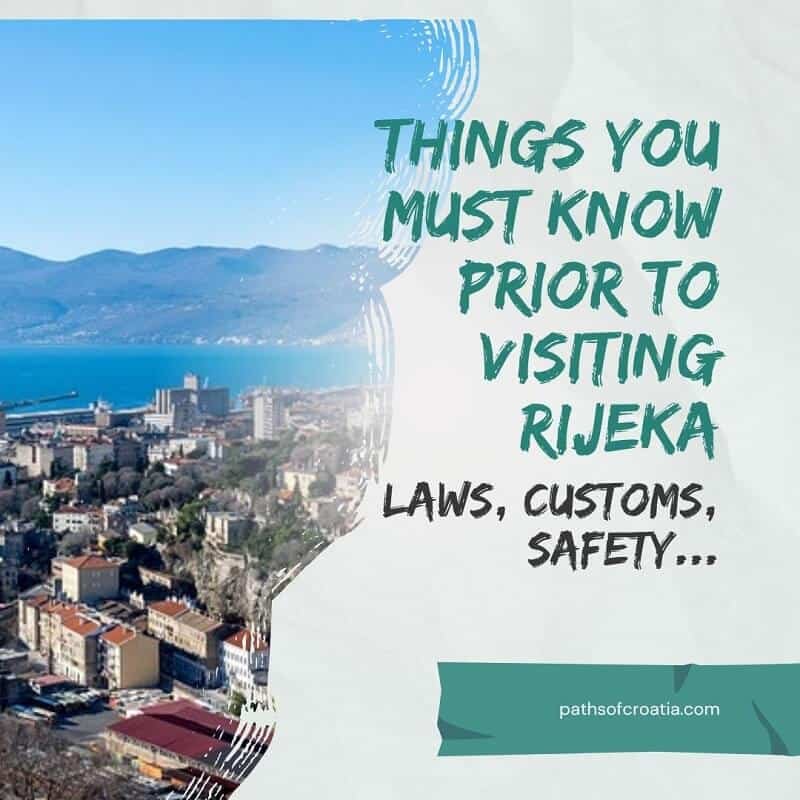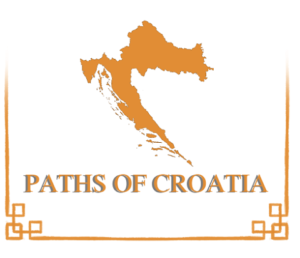
Rijeka is a lovely, port town that’s close to many Croatian attractions and if you are visiting it any time soon, you’ll need to be aware of a few things.
I decided to create a list of possible questions you might have and offer you pieces of advice, so you can enjoy your stay in Rijeka to the maximum.
As a local I am aware of the pros and cons of Rijeka, so let’s see what you should know either as a tourist who’ll stay in Rijeka for a few hours or spend days.
Can you drink tap water in Rijeka?
Tap water in Rijeka is among the best tap waters in Croatia, and it’s completely safe to drink.
Sometimes when traveling I forget that not everywhere you can drink water straight from the tap. Rijeka has not only safe tap water but the water is among the cleanest and most tasty tap waters you’ll try.
Our tap water is clean, without odor, and doesn’t have a distinctive taste which is a good thing, because that’s exactly what the water should taste like, pure, and refreshing without any weird flavors which could come from the lead and other questionable sources.
The only better “tap water” I have tried was on the island of Krk where you can stop by the road in the middle of nature and collect some free-running water which pours from the rocks and is collected from a pipe.
How safe is Rijeka?
Rijeka is a highly safe city which can be confirmed by the study done based on numerous surveys.
Moreover, I can confirm this as a local, so you can feel safe even during the night walks.
In my lifetime spent in Rijeka, I haven’t heard of many serious accidents and I’d regularly hang out during the week and weekends and stay in contact with people.
There have been some fights, robberies, and pickpockets from time to time, but that’s extremely rare and expected for any town to a degree.
You don’t have to worry about bumping into hooligans and other mean people on the streets as they are a rare exception.
Rijeka is even pretty safe for women walking down the dark streets in suburbia, as the crime rates are seriously low.
However, although rare, pickpockets can happen in buses, and at certain busy locations so be careful where you hang your belongings.
One of such places of increased pickpocketing risk is at Zabica Square, and I have personally witnessed a few times the pickpockets rushing and stealing the bags and wallets from people who were to busy paying attention to incoming buses.
So, while you can feel safe during your stay in Rijeka, hold to your belongings and keep them at a safe place you can see and have a control over when visiting busy places.
In case of emergency
In case of emergency call Europe’s wide Emergency Number 112. After calling this number the dispatchers will connect you with the required help whether you need a hospital, police, or fire department.
The town’s main emergency room is located in Krešimirova 42.
In case of a car accident, you can call HAK road help at 385 072 1987 00.
And finally, having reliable insurance is a must! Croatia has excellent hospitals, doctors, and emergency teams, but in case of serious injuries or sickness, without good insurance such as SafetyWing the expenses might get really scary.
Roads and traffic
Generally, roads are fine, but it’s not unusual to find old, uneven roads with bumps that aren’t ideal for low, luxury vehicles.
Regarding the laws, the maximum blood alcohol level for drivers above 24 is 0.05 mils.
The speed limit in urban areas is 50 km/h and goes up to 90 km/h on open roads and finally to 130 km/h on highways.
Regarding the traffic, the traffic jams are not anywhere close to the jams you will experience in big towns such as in New York, but sometimes minor traffic jams occur.
For this reason, locals avoid traveling through the town center and rather drive on the newly built fast bypass road which connects the town with every point of interest.
Moreover, the entire town is well-connected with busses, so this is the main transportation method for those who avoid driving cars or walking.
Money and transactions
Since 2023 the new Croatian currency is Euro and it’s accepted everywhere.
Most places like restaurants, gas stations, and stores accept credit cards, but be careful as some local food chains and coffee bars may not accept credit cards.
Thus, it’s always smart to have some cash in your pockets just in case that the place doesn’t accept credit cards.
Furthermore, most exchange services in the town offer decent rates, and the odds of getting scammed during the transactions are extremely low.
Tipping
Tipping in Croatia isn’t mandatory as servants and employees get paid a salary that is close to the average Croatian salary.
However, tipping is always recommended if you like the person who served you and most servants during the summer are students who depend on tips if they want to bring some money back home.
There aren’t any hard rules on how much you should tip, so tip approximately to what you think is right and what the person deserves.
Electricity and plugs
Croatia operates on a 230V supply voltage and 50 HZ and uses the European C and F plug types.
So, American visitors might need a transformer to enjoy the use of electrical appliances.
Smoking
While smoking is popular in Croatia, today most restaurants and many bars forbid smoking inside and rather have a designated smoking area.
Rijeka follows the trend, and while most places where you can enjoy a drink are smoke-friendly, you’ll be able to find locations that don’t allow smoking on their premises.
Smoking is also pretty common on the streets and people don’t always bear in mind that cigarettes should be thrown on the ground which is unfortunate.
So, in conclusion, you’ll see a big difference when it comes to smoking culture in Croatia compared to states such as Sweden.
Public toilets
You’ll always find public toilets in Rijeka at 2 places in the town, at Zabica Square and at Delta Park, and near Trsat sanctuary outside the town center.
Zabica Square is the place where the busses arrive and the tickets are sold, while Delta Park is further in the town near Hotel Continental and across Mrtvi Kanal.
It’s possible to find public toilets at other places in the town (Link to Rijeka webpage) but the mentioned public toilets are the closest to most people who reside in the town and are open from 2 pm to 6.30 pm on most days.
Public toilets in Rijeka are free of charge and regularly maintained, so the hygiene level is high from what I have witnessed as a local for the past 26 years.
If no public toilets are open or you can access them, all supermarket facilities have awesome toilets and you can always use toilets in bars, and restaurants.
Public drinking
While Rijeka has a decent nightlife scene, it’s also common to bump into people who drink at parks and at beaches while listening to music or playing the guitar.
This is due to the fact that Croatian youth enjoys the lovely summer nights and the breeze while drinking was always part of the culture.
A few beers or a bottle of wine is standard for our youth whether they enjoy it at bars, nightclubs, or outside as the weekend is finally the opportunity to get the stress relief caused during the week.
Although public drinking is technically forbidden by the law, police are not likely to give you a fine just because you had a beer in hand while admiring the local beauties, and were mesmerized by the town’s hospitality.
Wild camping
Wild camping is technically illegal everywhere in Croatia, so Rijeka isn’t an exception.
Wild camping can be considered sleeping in a car by the road, to sleeping on a beach.
However, in reality, if you are just having fun somewhere in nature or on a beach in Rijeka, you can enjoy the stay without worrying that someone will disturb you as long as you have proof of residence.
Thus, as long as you rent a room or are visiting friends, you have a residence place, so it’s unlikely that you’ll have any troubles with activities that could be considered as wild camping.
The obvious exception is parking the camper or setting up a tent in a public place, as that’s a pretty obvious wild camping case that is highly forbidden.
